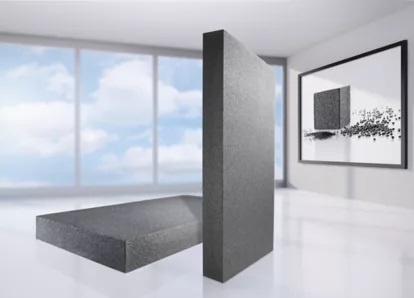Petrochemical
BASF expands expandable polystyrene portfolio
Neopor F 5 Mcycled contains 10 per cent recycled material and is suitable for numerous applications in buildings, particularly facade insulation
-
By ICN Bureau | March 13, 2022
BASF has expanded its portfolio of graphitic expandable polystyrene (EPS) granulate. Neopor F 5 Mcycled contains 10 per cent recycled material and is suitable for numerous applications in buildings, particularly facade insulation. The new raw material is produced using the extrusion process and offers the same proven mechanical properties and optimised insulation performance as Neopor F 5200 Plus.
BASF has developed the new raw material together with Karl Bachl GmbH & Co KG and turned it into a market-ready product. The quality of the recycled material used plays a pivotal role in meeting the exacting product demands in the various construction applications. This high quality standard is one of the keys to the success of the cooperation between BASF and Bachl. Both the recycled material used and the insulation raw material are REDcert2-certified. The recycled material comes from mechanically recycled EPS waste. Currently (Conversio study from 2019), at least 42 % of the EPS packaging waste in Germany is recycled. “Today’s EPS insulation materials from the construction and packaging sectors can be fully recycled. At present, the high-quality recycled material is mainly sourced from waste streams from the packaging sector. That means we can already ensure that the recycled material is of the necessary high quality,” says Michael Küblbeck, Managing Director of Karl Bachl GmbH & Co KG.
The ambitious climate targets cannot be achieved without energy-efficient building envelopes. In both new construction and renovation projects, insulation materials made of Neopor are now standard in facade insulation. During their decades of use, they significantly reduce CO2 emissions from buildings. “Closing material loops and reducing CO2 emissions are two of the priorities of current climate policy. Our sustainable Neopor insulation raw materials contribute directly to these efforts. With Neopor F 5 Mcycled, BASF can offer an insulation raw material with a closed EPS recycling loop for the first time. At the moment, high-quality recycled EPS material is still in limited supply. In the coming years, we want to work with our European partners to increase EPS recycling along the entire value-added chain and expand it to other waste streams. This will pave the way for more widespread use of mechanically recycled EPS in high-quality applications,” says Klaus Ries, Vice President Business Management Styrenics Europe at BASF.
With Neopor F 5 Mcycled, BASF is expanding its EPS portfolio with an improved sustainability profile. The new raw material complements the mass-balanced products Styropor Ccycled and Neopor BMB, which are produced from alternative raw materials. For the production of Styropor Ccycled, fossil raw materials are replaced by pyrolysis oil, which is obtained from chemically recycled plastic waste. The pyrolysis oil is allocated to the subsequent end product via the mass balance approach. Styropor Ccycled has a significantly improved carbon footprint and contributes to the circular economy. In the production of the insulation raw material Neopor BMB, fossil raw materials are replaced by renewable feedstock using the biomass balance method (BMB). This reduces the carbon footprint of the insulation raw material by up to 90 per cent in the production phase alone, compared with traditionally produced Neopor. At the same time, the insulation material retains all its proven product properties.
